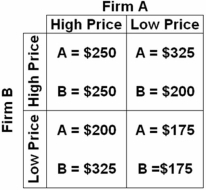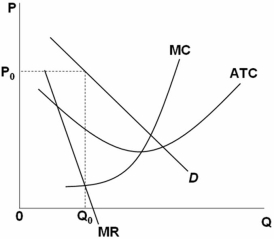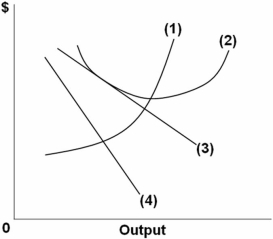A) a.
B) b.
C) c.
D) d.
Correct Answer

verified
Correct Answer
verified
Multiple Choice
Collusive control over price may permit oligopolists to:
A) use new technology,achieve economies of scale,and get government subsidies.
B) achieve economies of scale,reduce costs,and prevent price cheating.
C) increase product demand,increase product supply,and lower cost.
D) reduce uncertainty,increase profits,and possibly limit entry of new firms.
Correct Answer

verified
Correct Answer
verified
True/False
Firms are more likely to collude when the economy is in a recession.
Correct Answer

verified
Correct Answer
verified
Multiple Choice
In monopolistic competition,there is:
A) allocative efficiency.
B) productive efficiency.
C) both allocative and productive efficiency.
D) neither allocative nor productive efficiency.
Correct Answer

verified
Correct Answer
verified
Multiple Choice
One shortcoming of the kinked-demand curve model of oligopoly is it does not explain:
A) why the marginal revenue curve is kinked.
B) how the going price gets determined in the first place.
C) what the equilibrium level of profits is for the firm.
D) why the firm is a least-cost producer.
Correct Answer

verified
Correct Answer
verified
True/False
If a monopolistically competitive firm's optimal level of output occurs where P < AVC,it will shut down.
Correct Answer

verified
Correct Answer
verified
Multiple Choice
If an oligopolist's demand curve has a "kink" in it,then:
A) the oligopolist's marginal cost curve has a break in it.
B) the oligopolist need not fear entry into the industry by new firms.
C) the oligopolist's competitors will not react to its price changes,either up or down.
D) over some interval,a change in the oligopolist's marginal cost will not cause a change in the oligopolist's profit-maximizing price.
Correct Answer

verified
Correct Answer
verified
Multiple Choice
A characteristic of monopolistically competitive industries is that:
A) there is product differentiation but only limited advertising of products by the representative firm.
B) the entry and exit of firms causes the representative firm to break even in the long run.
C) the representative firm is not very responsive to changes in consumer demand.
D) the representative firm produces at that level of output where marginal cost equals minimum average total cost.
Correct Answer

verified
Correct Answer
verified
Multiple Choice
Compared to pure competition,monopolistic competition:
A) provides greater product differentiation at the cost of some excess capacity.
B) offers less product differentiation but attains equal productive efficiency.
C) provides greater product differentiation and achieves greater productive efficiency.
D) offers less product differentiation and lower productive efficiency.
Correct Answer

verified
Correct Answer
verified
Multiple Choice
 Refer to the above payoff matrix.If both firms collude to maximize joint profits,the total profits for the two firms will be:
Refer to the above payoff matrix.If both firms collude to maximize joint profits,the total profits for the two firms will be:
A) $350 million.
B) $400 million.
C) $500 million.
D) $525 million.
Both firms collude and settle on a high-price strategy.This results in $250 million profits each,or $500 million total.
Correct Answer

verified
Correct Answer
verified
Multiple Choice
Which set best describes the basic features of monopolistic competition?
A) Easy entry,few firms,and standardized products
B) Barriers to entry,few firms,and differentiated products
C) Easy entry,many firms,and differentiated products
D) Barriers to entry,many firms,and standardized products
Correct Answer

verified
Correct Answer
verified
Multiple Choice
The U.S.primary steel industry is best described as a:
A) cartel.
B) monopoly.
C) differentiated oligopoly.
D) homogeneous oligopoly.
Correct Answer

verified
Correct Answer
verified
Multiple Choice
 Refer to the above graph.It represents a monopolistically competitive firm in a constant-cost industry.The firm:
Refer to the above graph.It represents a monopolistically competitive firm in a constant-cost industry.The firm:
A) will produce less than Q0.
B) will produce more than Q0.
C) is earning an economic profit at Q0.
D) is suffering an economic loss at Q0.
Correct Answer

verified
Correct Answer
verified
Multiple Choice
In the long run,a representative firm in a monopolistically competitive industry will typically:
A) have an elasticity of demand that will be less than it was in the short run.
B) have a larger number of competitors than it will in the short run.
C) produce a level of output at which marginal cost and price are equal.
D) earn a normal profit,but not an economic profit.
Correct Answer

verified
Correct Answer
verified
Multiple Choice
 Refer to the above graph of a representative firm in monopolistic competition.What does line 2 represent?
Refer to the above graph of a representative firm in monopolistic competition.What does line 2 represent?
A) Demand
B) Marginal cost
C) Marginal revenue
D) Average total cost
Correct Answer

verified
Correct Answer
verified
Multiple Choice
A major characteristic of monopolistic competition is:
A) mutual interdependence.
B) a high degree of collusion among firms.
C) a relatively large number of firms selling the product.
D) relatively easy entry into an industry but a relatively difficult exit from the industry.
Correct Answer

verified
Correct Answer
verified
True/False
An oligopolist producing where MR > MC should lower its price and increase output to maximize its profits.
Correct Answer

verified
Correct Answer
verified
Multiple Choice
Which statement concerning monopolistic competition is false?
A) Long-run equilibrium under monopolistic competition is achieved where economic profits are zero.
B) Monopolistic competition is likely to result in a greater variety of product brands than pure competition.
C) The monopolistically competitive demand curve is more elastic than the demand curve facing a monopolistic firm.
D) Monopolistic competition does not lead to any economic inefficiency since firms in this industry cannot sustain economic profits.
Correct Answer

verified
Correct Answer
verified
Multiple Choice
The U.S.beer industry:
A) sells a growing proportion of its product for consumption in bars and taverns.
B) was made more competitive by technological advances such as faster bottling lines.
C) was formerly a monopolistically competitive industry,but today it is an oligopoly.
D) has experienced competition from a growing number of independent brewers over the past 40 years.
Correct Answer

verified
Correct Answer
verified
Multiple Choice
Which statement about oligopoly is false?
A) Oligopolistic firms recognize their interdependence.
B) Prices in oligopoly are predicted to fluctuate widely and frequently.
C) A few firms play an important role in the sale of an identical or differentiated product.
D) There is no single predicted pattern of action and reaction for oligopolists because one firm's behavior is a function of what its rivals do.
Correct Answer

verified
Correct Answer
verified
Showing 121 - 140 of 179
Related Exams